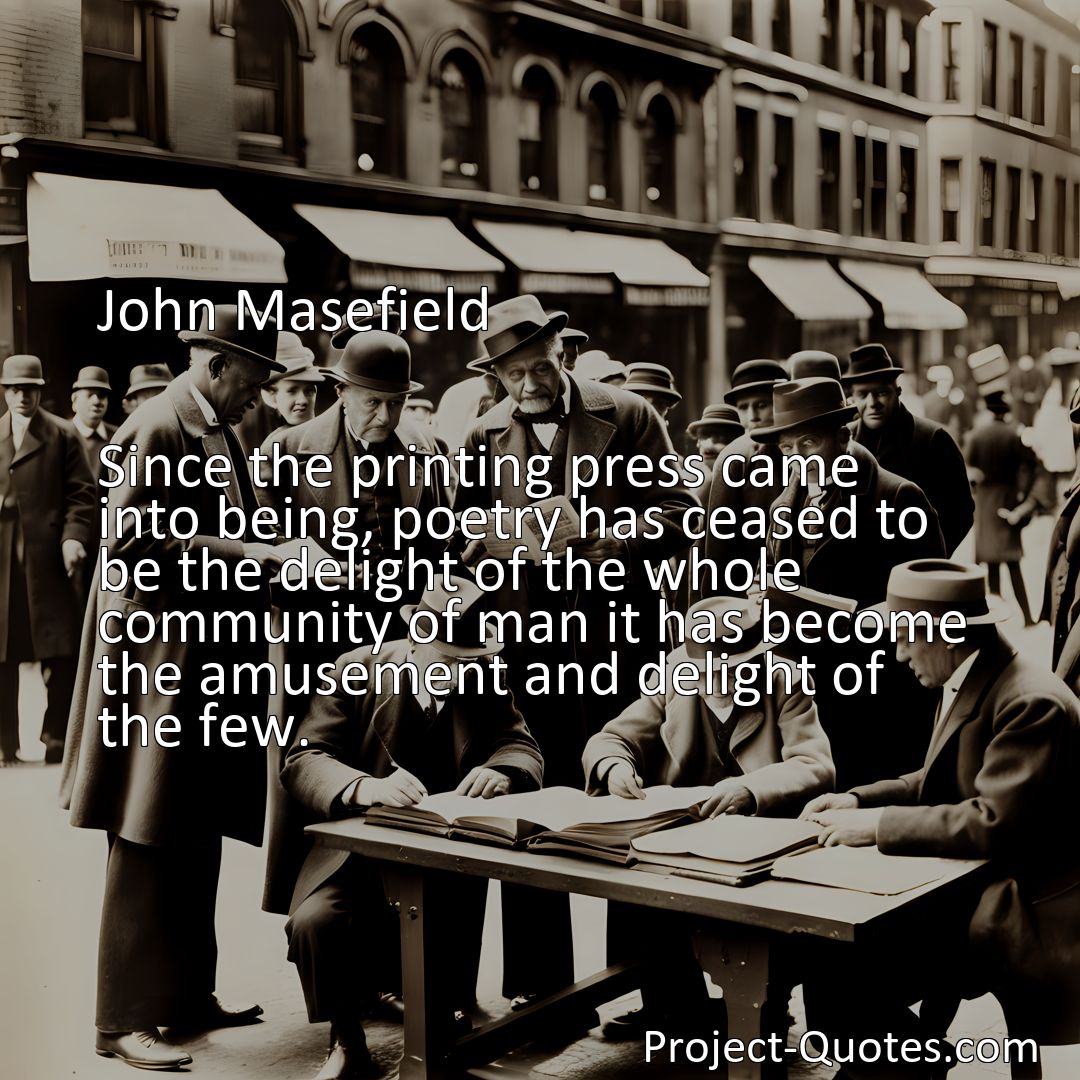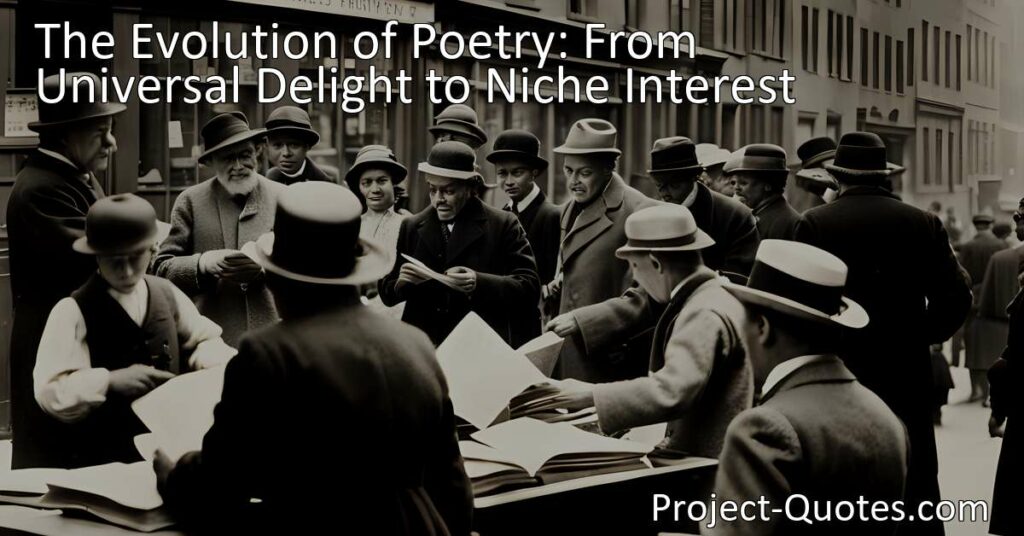Since the printing press came into being, poetry has ceased to be the delight of the whole community of man it has become the amusement and delight of the few.
John Masefield
Poetry, once cherished and enjoyed by people from all walks of life, has undergone a significant transformation since the invention of the printing press. In the past, poetry was a shared experience that resonated with the whole community, but now it has become a niche interest, only appreciated by a select few. The rise of alternative forms of entertainment and the perception of difficulty associated with understanding poetry have contributed to its decline in popularity. However, poetry remains valued by a dedicated community who recognize its timeless beauty and power of expression.
Table of Contents
- 1 Since the printing press came into being, poetry has ceased to be the delight of the whole community of man it has become the amusement and delight of the few.
- 2 John Masefield
- 3 Meaning of Quote – Since the printing press came into being, poetry has ceased to be the delight of the whole community of man it has become the amusement and delight of the few.
- 4 Freely Shareable Quote Image
- 5 Related
Meaning of Quote – Since the printing press came into being, poetry has ceased to be the delight of the whole community of man it has become the amusement and delight of the few.
For centuries, poetry has been cherished as a form of artistic expression that brings joy and reflection to people from all walks of life. However, with the advent of the printing press, there has been a noticeable shift in the way poetry is perceived and consumed. While in the past, poetry was once the delight of the whole community, it has now become a niche interest, enjoyed only by a select few.
The printing press, invented by Johannes Gutenberg in the 15th century, revolutionized the way information was disseminated. Prior to its invention, books were painstakingly copied by hand, making them rare and expensive commodities. This limited access to literature and poetry, leaving only the educated elite able to engage with such works. However, with the printing press, books, including poetry collections, could be mass-produced and made more affordable. The dissemination of literature became increasingly widespread, enabling wider access to poetry for the general populace.
In those early years of the printing press, poetry thrived as more people had the opportunity to read and appreciate it. The works of renowned poets such as William Shakespeare, Emily Dickinson, and Robert Frost became available to the masses, creating a shared experience and understanding through the power of their words. Poetry became a universal language, singing the joys and sorrows of the human condition.
However, as time went on, the accessibility of poetry brought about a change in the dynamics surrounding its appreciation. The rise of other forms of entertainment, such as novels, plays, and later cinema and television, gradually shifted the attention of the larger community away from poetry. These new forms of media provided more immediate gratification and visual stimulation, drawing people away from the more contemplative nature of poetry.
Moreover, as various art forms competed for public attention, poetry’s brevity and depth became less compatible with the fast-paced lifestyle that modern society began to embrace. The fascination with instant gratification and easily digestible content led to a decline in the popularity of poetry. The demands of modern life made it harder for people to find time to engage with the slower, more introspective experience that poetry often offers.
Another factor contributing to poetry’s decline in popularity is the perception of difficulty associated with understanding and appreciating it. The use of figurative language, complex metaphors, and abstract concepts often presents a challenge to readers, particularly those who are not accustomed to the intricacies of poetic expression. This perception, coupled with an education system that may not emphasize the exploration and analysis of poetry, has led to a decreased interest and understanding of this art form among the general public.
Despite these challenges, it is essential to recognize that poetry still holds tremendous value and has not entirely lost its place in the hearts of those who appreciate it. Although it may no longer be a widespread delight, it continues to captivate and inspire a devoted community of individuals who revel in its beauty and depth. For these individuals, poetry provides a space for introspection, a means of emotional release, and a tool for connecting with others who share a similar appreciation.
Furthermore, the advent of the internet and social media has served as a unique platform for the revival and reinvention of poetry. Online platforms have allowed poets to share their work with a broader audience, reaching individuals who may not have otherwise encountered poetry. Poets have also adapted their craft to fit modern forms, such as micro-poetry or spoken word performances, thus making it more accessible to the digital generation.
In recent years, social media platforms like Instagram and Tumblr have become popular havens for poets to showcase their work, often accompanied by aesthetically pleasing visuals. These platforms attract a younger demographic and offer an engaging and interactive space for poets and readers to connect. As a result, poetry has gained renewed attention and found a place in the lives of individuals who may not have previously engaged with the art form. It has become an avenue for self-expression and a community for like-minded individuals to come together and find solace in the power of words.
It is important to acknowledge that while poetry may have become less ubiquitous, its influence and impact endure. The perceived decline in its popularity should not diminish its significance or invalidate its ability to move, inspire, or provoke thought. Poetry has the power to capture the essence of human experience, evoke emotions, and provide solace in times of joy or sorrow. It continues to be a testament to the resilience of the human spirit and the enduring power of artistic expression.
In conclusion, while it is true that poetry has become less widely enjoyed since the advent of the printing press, it remains an art form that holds immense value and intrinsic beauty. The accessibility of poetry through the mass production of books initially brought about a widespread enjoyment, but changing societal dynamics and the rise of alternative forms of entertainment have shifted the focus of the larger community away from it. However, poetry still lives on, cherished by a passionate and dedicated community of individuals who recognize its ability to transcend time, express complex emotions, and provide a sanctuary of respite in a fast-paced world. Although the prominence of poetry may have shifted, it continues to nourish those who seek its solace and delight.
I hope this quote inspired image brings you hope and peace. Share it with someone who needs it today!


